What’s in This Guide:
What Causes an Air Conditioner to Freeze up in the Summer?
Signs of a Frozen AC Unit
Four Preventative Maintenance Tips to Keep AC from Freezing
A frozen AC unit might seem counterintuitive during a sweltering Amarillo summer, but insufficient maintenance can lead to a frozen evaporator coil and various associated issues. Despite the soaring temperatures, there’s no need to sweat — with proper DIY troubleshooting practices, you can keep your AC from freezing up and restore cool air to your home in no time.
Learn the causes of a frozen AC unit, the signs to look for, and how to keep your system running properly.
What Causes an Air Conditioner to Freeze up in the Summer?
Several underlying problems can cause an air conditioner to freeze, such as poor airflow, damaged parts, and leaks in your AC system. These issues can also cause other problems when left unrepaired. Read on to learn more.
Clogged air filters
Your AC unit has an air filter that helps purify your indoor air and keep external dirt from clogging up the system. Dirty, clogged, or incompatible air filters become blocked, slowing air flow through the system. Poor airflow causes humidity to build up and freeze onto the coils.
Blocked air ducts
Without proper maintenance and cleaning, air ducts become damaged or blocked and restrict airflow, likewise causing freezing around your system’s coils. During a hot Amarillo summer, some people may also close their vents in some rooms to focus the cold air into others. Closing too many intake or exhaust vents, however, can affect the system’s pressurization and restrict airflow, resulting in additional stress on the unit, reduced energy efficiency, and frozen coils.
Damaged blower fan
The blower fan keeps air moving through the system. If it malfunctions or breaks down completely, airflow can slow or stop altogether and freeze the unit’s coils. Corrosion, loose components, lack of lubrication, debris, electrical issues, and other problems can also result in a malfunctioning blower fan.
Low coolant
As coolant passes through the coils, it lowers the temperature and humidity of the indoor air. Low coolant, either due to leaks or poor charging, results in insufficient pressure needed to regulate the coil’s temperature, causing the system to freeze up. Hissing or bubbling along the line or increased energy costs can indicate a leak, which slowly drains your coolant, damages your system, and poses potentially hazardous exposure. HVAC technicians can sometimes repair a leak, but they may need to replace the system altogether.
Dirty evaporator coil
The evaporator coil, which houses coolant, requires professional cleaning to keep it operating properly. Debris accumulation on the coil can result in humidity buildup and poor heat diffusion, leading to a frozen coil.
Blocked drain line
The evaporator coil removes humidity from the air, then directs it through the exterior condensate drain line. Mold, grime, and other debris can block the drain line, causing water to back up to the evaporator and freeze during cooling cycles.
Signs of a Frozen AC Unit
Several signs can indicate freezing in your AC unit, including:
- Ice: Ice is an obvious sign of freezing in the unit, but visible ice on the evaporator coil or refrigerant line are telltale signs of a system inefficiency or malfunction.
- Condensation or leaking: In the absence of ice, excessive condensation on the AC unit and ductwork can signal freezing issues.
- Poor temperature regulation: If your unit isn’t properly absorbing warm air, you may notice poor cooling in your home and short cooling cycles.
- Inconsistent air distribution: Just as poor airflow can result in a frozen evaporator coil, it’ll also limit air re-entry into your home and cause cold or warm spots.
- Strange noises: In addition to hissing from coolant leaks, buzzing, knocking, whistling, and other sounds can hint at the cause of a frozen coil.
Four Preventative Maintenance Tips to Keep AC from Freezing
Regular maintenance is key to preventing your AC from freezing and an array of other issues. These issues can cause undue wear on your system. Preventing them before they occur can help extend the lifespan of your AC unit, improve energy efficiency, and save on costs. Keep cool during the summer by practicing these strategies throughout the year:
- Replace air filters: Depending on your home, pets, air quality, and other factors, change your air filter at least every three months. Check your owner’s manual to verify the correct replacement filter model.
- Clean coils: Coils require regular maintenance — carefully remove debris with compressed air or a soft bristle brush, or call a technician for professional service.
- Keep vents open: Avoid pressure imbalances, energy inefficiency, and unnecessary wear on your ductwork by keeping vents open and unobstructed.
- Schedule regular inspections: Regular professional inspections and maintenance are the best way to ensure proper AC function throughout its lifespan. HVAC technicians have the skills, knowledge, and experience to safely and efficiently assess and maintain your system and recommend AC repairs.
Keep Your AC Performing Optimally with Frank’s Repair Plumbing in Amarillo, Texas
Setting your thermostat as low as possible won’t help cool your Amarillo home if there’s bigger issues at play. With a membership to the Diamond Club at Frank’s Repair Plumbing, our technicians provide thorough system inspections and maintenance services to keep your AC unit from freezing up.
Take advantage of NATE-certified and state-licensed technicians by scheduling a service with our team at Frank’s Repair Plumbing. Contact us today or book online to get started.


